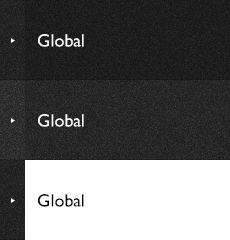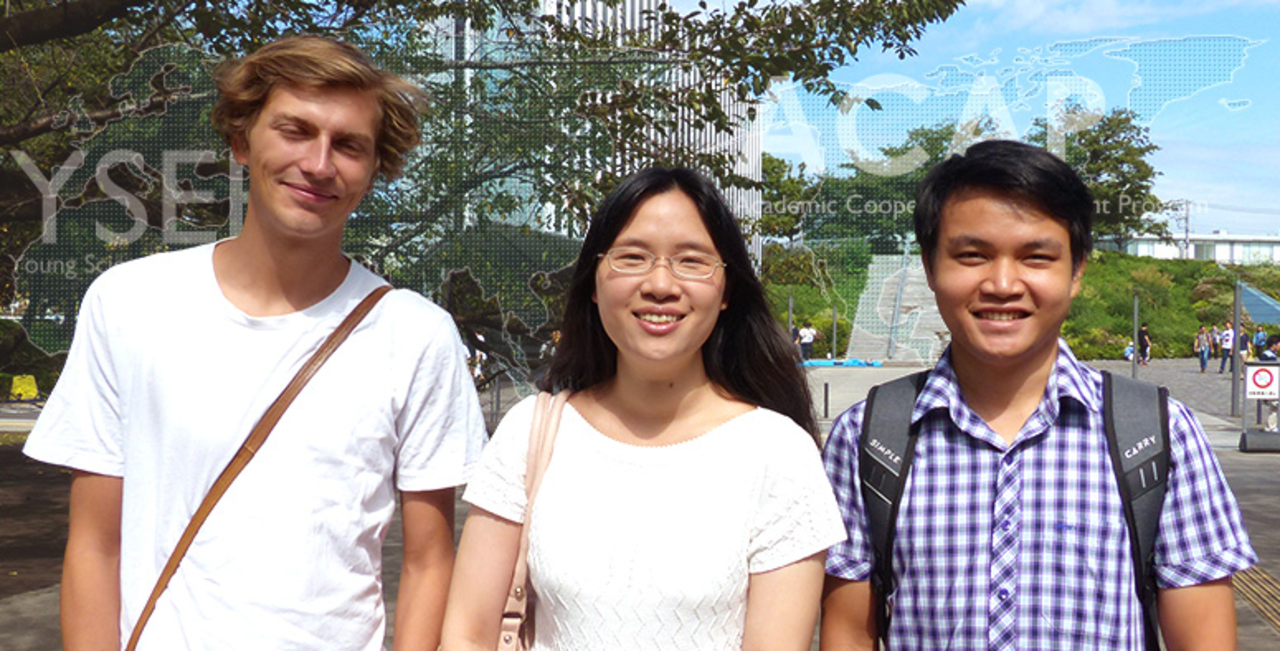
The Institute has been offering inbound international students with little or no knowledge of the Japanese language the chance to enjoy the Tokyo Tech experience since the turn of the century. Two of the Institute's hallmark exchange programs — the Young Scientists Exchange Program (YSEP), which began in 2000, and the Academic Cooperation Agreement Program (ACAP), which started in 2011 — allow undergraduate and graduate students to join Tokyo Tech for a period of up to one year. Both provide an inside view of Tokyo Tech research and Japanese culture, but how are they different?
We followed a discussion between three students, two of whom are currently in the ACAP program, and one who recently completed the YSEP program, about their experiences and the particular features of the two programs.
* The content of this article was accurate at the time of the interview in August 2016.
ACAP students
Pei-Rung Lin from Taiwan
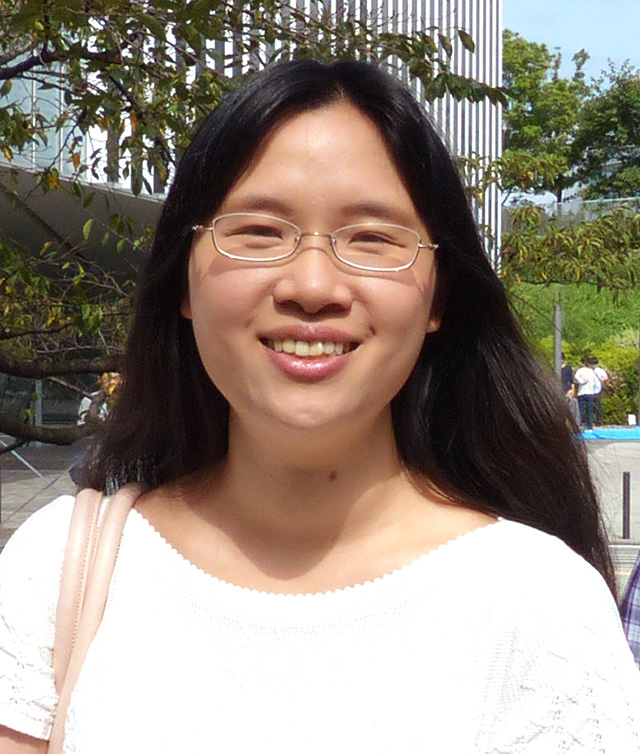
Computer science and information engineering,
National Central University, Taiwan
Current research interests: Machine learning and pattern recognition in music retrieval
Jonas Klaassen from Germany
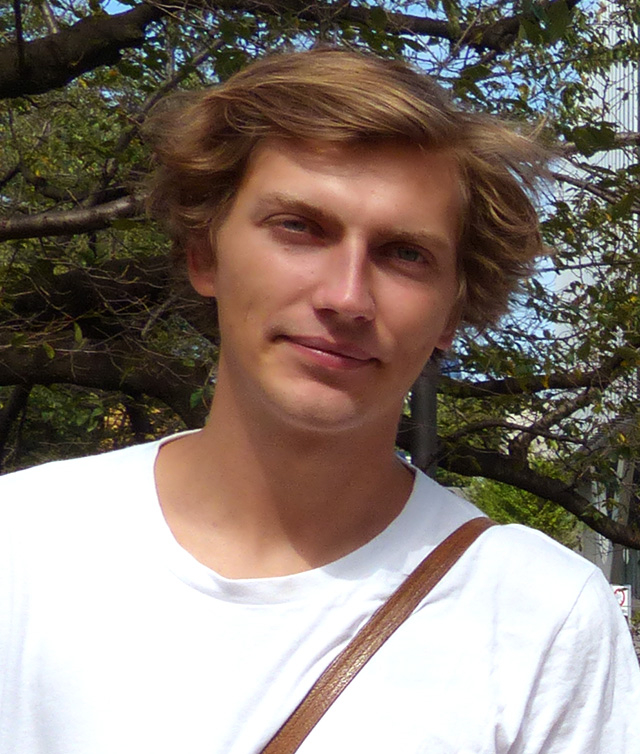
Architecture, RWTH Aachen University
Current research interests: Critical theory and environmental
factors in spatial composition
YSEP student
Dinh Ngoc Pham from Vietnam
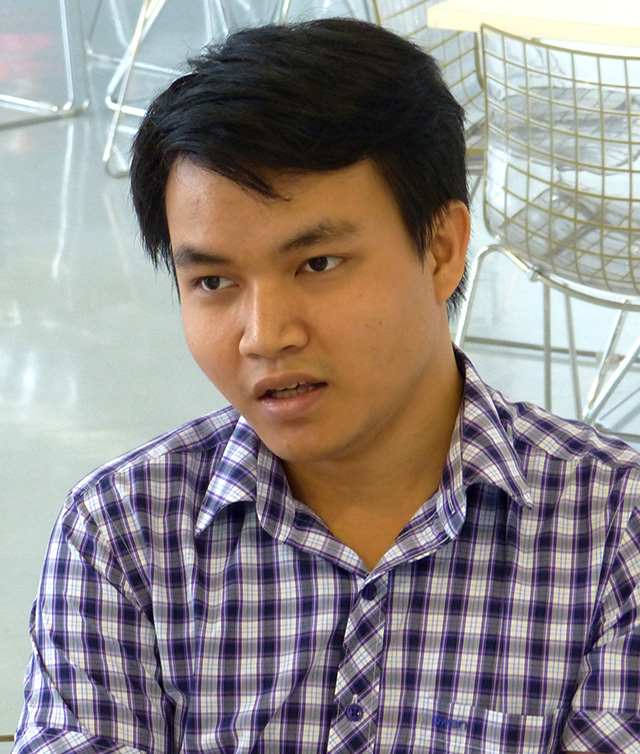
Materials science and technology,
Hanoi University of Science and Technology at time of exchange, now master's student in Tokyo Tech's International Graduate Program (IGP) (A)
Current research interests: Synthesis and characterization of magnesium/carbon nanotube composites by spark plasma sintering
What brought you to Tokyo Tech?
Pei-Rung: I very much wanted to do an exchange in Japan, and there were a lot of options for me. The National Central University in Taiwan has many partner universities that I could have chosen, but I decided to join the ACAP program because I thought it would be a great way to evaluate whether I want to go to graduate school. I major in computer science, and I can really get a taste for research here while still at the undergraduate level.
Jonas: I am from northern Germany, and I completed my bachelor's degree at RWTH Aachen. Of course I wanted to gain international experience, but I am also particularly interested in Japanese architecture and individual Japanese architects. The Centennial Hall we are sitting in now, and its creator Kazuo Shinohara, are great examples. I had a choice between going to Osaka and coming here to Tokyo Tech on the ACAP program, and I am very happy about the choice I made.
Dinh: My labmates back home in Vietnam introduced me to the YSEP program, saying that studying at Tokyo Tech would be very useful in advancing in my chosen field of materials science and biomaterials. After exploring the YSEP website, I decided to apply. Coming here was a big step for me. My supervisor was very supportive, and was impressed with the research I conducted. As a result, he recommended that I join an international conference in Osaka to build on my YSEP research and later apply for the IGP program, which I joined.
Jonas: I mentioned my own fascination with Japanese architecture, but was there any particular reason why you specifically chose Japan rather than another country for your year abroad?
Dinh: In addition to the recommendations from my fellow students, I was always aware of the exceptional equipment and facilities available in Japan that would help me further my research. That just made it easier for me to apply to the YSEP program.
Pei-Rung: For me too, it was a matter of quality. The technology in Japan is world-class, so the decision was not too difficult once I discovered the ACAP program.
What have you found particularly useful or enjoyable about the program you joined?
Jonas: One thing I have found very useful so far is the tutor system, where every exchange student is paired with a Japanese student tutor who helps us adjust to life in Japan. These tutors are available to answer any questions regarding daily life, for example, how to open a bank account. My tutor was very helpful, particularly right after my arrival. I believe these students get paid for their time, so it is also a source of part-time work for Japanese students.
Pei-Rung: The time spent in our lab has been both useful and enjoyable. The intimate environment is not only ideal for focusing on research; it also functions as a great place to make new friends. I have only been here for six months, but I have already gotten to know many students from both Japan and other countries. I am only here for one year, so before I return to Taiwan to finish my degree, I want to make the most of every day. The lab guarantees that I am always surrounded by friendly, like-minded people.
Dinh: In addition to the challenging courses I was required to take during the YSEP program, the collaboration and communication with Japanese companies was very informative. We were able to visit companies such as Nissan and Hitachi, and company employees were invited to Tokyo Tech to give special lectures. They also spoke to us about what their employers require of them, making the connection between my studies and potential future employment much clearer.
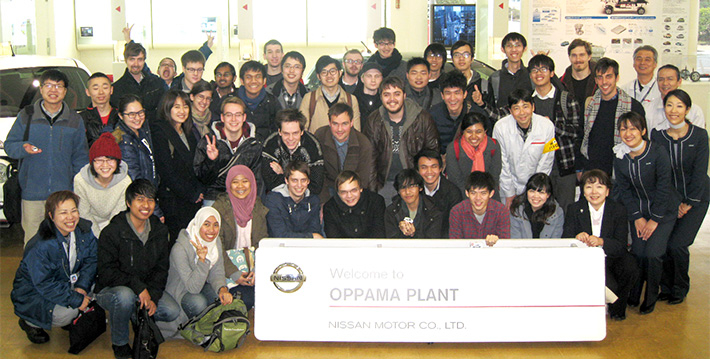
Pei-Rung: Were you required to take many courses during your YSEP experience? In the ACAP program, the main thing is to carry out your own research. Of course, if we want to, we can take courses and earn credits that can be transferred to our home institutions.
Dinh: Yes, in both the 6-month and 1-year YSEP program, students have to earn credits from Tokyo Tech to finish the program. But for me, this was very useful as I still had to finish my last year of university in Vietnam, and I was able to transfer my Tokyo Tech credits to my home institution. This made my last year much easier.
Jonas: What is nice about the ACAP program is that I can choose the courses I want to take. My home institution decides whether I receive credit for those courses or not. As an ACAP student, I am not eligible for all the courses available to IGP students but in terms of flexibility for travel and other activities, the ACAP program is excellent. Before coming here, I talked to students in Germany who had studied at Tokyo Tech, and they said the same thing. I have also spoken to architecture students from other universities in my dormitory, and I am convinced that I made the right choice in Tokyo Tech.
What has been the biggest challenge for you since your arrival?
Dinh: I have to say that for me, the biggest challenge has been the language barrier. Many of my labmates speak English, so most problems in oral communication can be solved relatively quickly, but documentation is another matter. I use a lot of equipment in my research, and English manuals are not always available. Of course I can get guidance from my classmates, but having to depend on them even when a small problem occurs can slow down my work and theirs.
Jonas: Yes, surely the language is a challenge, but fortunately my lab members make a conscious effort to communicate in English. Our seminars are also mostly held in English. There is a real sense of internationality in the Ryo Murata Lab. I can say that I get by quite well in Tokyo without speaking the language.
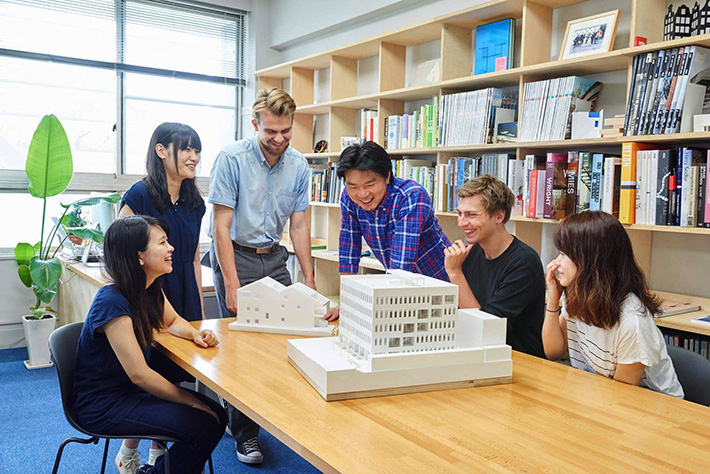
Pei-Rung: I have studied Japanese for 10 years, so the language has not been a problem for me. I didn't really experience a culture shock either since the people of Taiwan are very familiar with Japanese people and culture. Having said that, the first two months for me were still a challenge. It took some getting used to living in Japan.
Jonas: In addition to language, I have gained new perspectives on many aspects of life. I have learned new ways to approach architecture and design, culture, food, and many other things. I can take these perspectives home and compare them to the ones common in Germany. The flexibility of the ACAP program has also allowed me to travel to other destinations in Asia. Have you had the chance to do any traveling while in Japan?
Pei-Rung: I have visited several places in Japan, including the cities of Osaka, Nara, and Kobe.
Dinh: I was able to go skiing in Niigata with my labmates. It was the first time I ever saw snow. It was an interesting experience.
Jonas: Yes, our lab members also go on trips together from time to time, often for the weekend. It is an excellent way to get to know each other better. This type of lab culture is very different from what I am used to in Europe, where one is often not very familiar with fellow students or professors.
Do you have opportunities to interact with other international students outside your lab?
Jonas: There are always new international students moving in and out of my dormitory. Some students there get together on Saturdays for a game of soccer, which is a good way to make friends. It also provides a way for me to discuss problems and share experiences with students who are in the same position as I am. There are plenty of opportunities to communicate with other international students, so I have not found it too difficult to adjust to life here.
Pei-Rung: I also live in a dormitory, where I regularly get together with other international students. We cook a good meal together and exchange ideas about a variety of topics. I have found it to be a pleasant experience, too.
Dinh: I am also staying at one of Tokyo Tech's dorms, but if I decide to stay past next year, I will have to find an apartment of my own.
Pei-Rung: If you improve your Japanese, you can become a dormitory tutor and continue to live there. A dormitory tutor is responsible for helping international students at the dorm with any problems that may arise. One of my labmates did that and she continues to live in her dorm. Each floor at our dorm has a tutor.
What will you take home from your Tokyo Tech experience?
Dinh: For me, the most valuable experience here has been the opportunity to greatly improve my research skills, and the chance to work with so many different people. I plan to take a doctoral course and perhaps become a postdoctoral student after that, so developing my research skills further is imperative. In our lab, we had to present our research several times throughout the year, so that also greatly improved my presentation skills.
Pei-Rung: I think every day provides experiences that I will value in the future, and that is why I try to enjoy each day to the fullest. Back home I can always postpone things or visit places later, but here, my time is limited. I want to enjoy my day-to-day experiences as much as possible.
Who would you recommend your respective Tokyo Tech program to?
Jonas: When I was still back home, my seniors specifically recommended Tokyo Tech and the architecture professors here. The ACAP program has provided me with the precious opportunity to learn directly from these renowned architects. Therefore, I can recommend the ACAP program particularly to architecture students who are looking for a flexible program — one that allows you to explore Japan and Asia independently.
Pei-Rung: Based on my experiences so far, I can recommend the ACAP program to anyone who is looking for a student exchange experience in Japan.
Dinh: The YSEP program is suitable for anyone looking to greatly improve their research skills and gain firsthand experience from Japanese companies. I will certainly recommend the program to other students when I return home.
The Special Topics component of the Tokyo Tech Website shines a spotlight on recent developments in research and education, achievements of its community members, and special events and news from the Institute.
Past features can be viewed in the Special Topics Gallery.
Published: August 2017
. Any information published on this site will be valid in relation to Science Tokyo.









